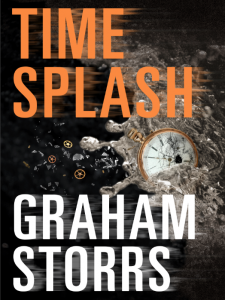One Week to the Timesplash Release
 My novel, Timesplash is due for release on 1st June. That’s exactly one week from today. It’s got me wondering about the concept of a ‘release date’. You see, the book has been ready for a while and people could have been buying it for a couple of weeks now. In fact, you can buy it, right this minute, if you want to. You just won’t get your copy until 1st June. I’ve been trying to decide whether holding it back serves any purpose and I can only think there must be a marketing reason for it.
My novel, Timesplash is due for release on 1st June. That’s exactly one week from today. It’s got me wondering about the concept of a ‘release date’. You see, the book has been ready for a while and people could have been buying it for a couple of weeks now. In fact, you can buy it, right this minute, if you want to. You just won’t get your copy until 1st June. I’ve been trying to decide whether holding it back serves any purpose and I can only think there must be a marketing reason for it.
Having a release date for something that could be bought right now, suggests a build-up of excitement as the day approaches, desperate fans in a frenzy of anticipation, queueing around the cyberblock to be the first to get their hands on a copy – like they do for Dan Brown and J.K. Rowling novels. But I’m not Dan Brown or J.K. Rowling and there is a distinct lack of frenzy going on. All across the world as the Big Day approaches, people are, if anything, becoming less frenzied, positively relaxed as far as I can see.
Of course, there is one real marketing benefit that a release date brings and that is to do with the way that book retail sites like Amazon calculate their book popularity rankings. If a lot of people by a book on a particular day, the ranking algorithm says to itself, “Ey up, it looks like this book is popular, eh but.” (You do know that algorithms talk to themselves in broad Yorkshire accents, don’t you?) So publishers (and self-published authors) try to mount a “Day 1 Purchase Campaign”. That is, they try to encourage as many people as possible who want the book, to buy it on the release date. That then pushes the book up the rankings, however briefly, in the hopes that it will hit the number one spot in its niche category (“technothrillers” and “science fiction” in Timesplash’s case). And the reason they want this is because, when you type a category into Amazon (say) to see what’s new in your favourite genre, the most popular books at that moment are the ones that appear at the top of the list. That means people will actually see your book – a prerequisite for them knowing that it even exists. So, extremely important, really. (Which means, if you are planning to buy Timesplash, the very best time to do it would be on 1st June. But, don’t worry if you’re being held by the police for minor public decency infringements that day, I’ll be just as happy if you buy it some other day.)
Of course, it could be that the release date is purely for the publisher’s benefit – an end point for the set of activities that lead to the creation of the book in a form that customers and buy and read, something to encourage author, editor, proofreader, layout, artwork, marketing, accounts, and everyone else to get their fingers out and achieve something rather than goofing off. As a one-time project manager, I know how important these milestones are in the life of a product.
Apart from that, the only other benefit a release date seems to confer is that it provides a ‘timing point’ for the co-ordination of all the marketing activities that go on before and after the release of a new book. And I suppose that’s not exactly non-trivial either, considering how many people are involved and all the stuff they’re doing.



